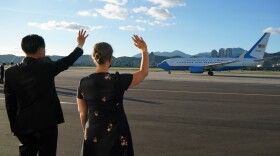
Julie McCarthy
Julie McCarthy has spent most of career traveling the world for NPR. She's covered wars, prime ministers, presidents and paupers. But her favorite stories "are about the common man or woman doing uncommon things," she says.
One of NPR's most experienced international correspondents, McCarthy opened the network's Tokyo bureau, "and never looked back." She has come full circle, recently returning to Asia to open the newest in the constellation of NPR's overseas bureaus in Manila.
In an overseas career spanning 25 years, she's covered Asia, Europe, Africa, the Middle East and South America.
Before assuming her current post as NPR's South East Asia correspondent based in Manila, McCarthy served as NPR's international correspondent based in New Delhi, India, where she spent six years. She'd crossed the border from Pakistan, where McCarthy had established NPR's first permanent bureau in Islamabad.
McCarthy won a Peabody Award for her coverage of Pakistan. She was named the Gracie Correspondent of the Year in 2011, and she was honored with the Southeast Asia Journalists Association's Environmental Award for her coverage of Pakistan's 500-year flood in 2010.
Before moving to Islamabad, McCarthy covered South America as NPR's bureau chief in Rio de Janeiro, Brazil, from 2005 to 2009. She covered the Middle East for NPR from 2002 to 2005, when she was first dispatched to report on the Israeli incursion into the West Bank, and later the war in Iraq and the turmoil in Saudi Arabia.
McCarthy's stint as London Bureau Chief for NPR often took her far afield from Britain. She spent months at NATO covering the war in the Balkans, reported for weeks on the devastating earthquake in Turkey in 1999 and devoted much of summer of 2001 at UN headquarters in Geneva covering the run-up to the Durban Conference on Racism. She covered the re-election of the late Robert Mugabe in Zimbabwe and traveled to the Indian island nation of Madagascar to report on political and ecological developments there.
Following the terror attacks on the United States, McCarthy was the lead reporter assigned to investigate al-Qaida in Europe. She traveled extensively in Iran following the Sept. 11 attacks to report on the Iranian reaction and the subsequent war in Afghanistan.
McCarthy was the first staff correspondent in Japan, assuming leadership of NPR's Tokyo Bureau in 1994. Her tenure there was a rich tapestry of stories including including the Kobe earthquake of 1995, the 50th anniversary of the atomic bombing of Hiroshima and the turmoil over U.S. troops on Okinawa. Her distinguished coverage of Japan won the East-West Center's Mary Morgan Hewett Award for the Advancement of Journalism.
McCarthy's coverage of the Asian economic crisis earned her the 1998 Overseas Press Club of America Award. That same year, McCarthy chronicled the dramatic fall of Asia's longest-running ruler President Suharto and the chaos that followed his toppling from power.
Prior to moving overseas for NPR, McCarthy was the foreign editor for Europe and Africa. She served as the Senior Washington Editor during the first Persian Gulf War. NPR was honored with a Silver Baton in the Alfred I. duPont-Columbia University Awards for its coverage of the conflict.
In her capacity as European and African Editors, McCarthy was awarded a Peabody, two additional Overseas Press Club Awards and the Ohio State Award.
NPR selected McCarthy to spend the 2002-2003 academic year at Stanford University where she won a place in the Knight Journalism Fellowship Program. Her time at the East-West Center in Hawaii in 1994 as a Jefferson Fellow helped launch her long career as an international correspondent for NPR.
McCarthy holds degrees in literature and history, and is a lawyer by training.
-
From the Philippines to Singapore, countries are worried the status quo could turn from tension to conflict. Southeast Asia especially feels the strain of living in the shadow of U.S.-China rivalry.
-
Shoppers encountered temperature checks and mall Santas behind plexiglas shields. But online sales may have stolen the show.
-
When the northern Iraqi city of Mosul was captured by Sunni militants, 40 Indian construction workers were taken hostage. It's one of the first diplomatic challenges for the new government in India, which sees millions of migrant workers move abroad and send some $70 billion back home to family.
-
India's new government faces its first major foreign policy test after the abduction of 40 Indian workers by suspected militants of the Islamic State of Iraq and Syria (ISIS).
-
India's transgender community is on a roll. Known as hijras, they recently won court recognition as part of a third gender. Now they're starring in a popular video urging drivers to buckle up.
-
The rape and lynching of two girls has caused an uproar and focused attention on sexual assaults. A lack of toilets forces women and girls to go outside at night, where they are vulnerable to attack.
-
As U.N. Secretary-General Ban Ki-moon demands a global end to violence against women, a 35-year-old is molested and shot in front of her husband and five children in India's northeast.
-
The men accused in the girls' murder belong to their area's dominant caste. Protesters and politicians are lashing out at delays and indifference in a case that is creating a political maelstrom.
-
Narendra Modi officially takes office as India's new prime minister in a ceremony in New Delhi that broke with the past. More than 3,000 guests witnessed India's most elaborate oath-taking.
-
Narendra Modi made his maiden visit to the halls of India's parliament Tuesday, shortly after being unanimously voted his party's leader. Then, he was off to the presidential palace to receive the invitation to form a government.





